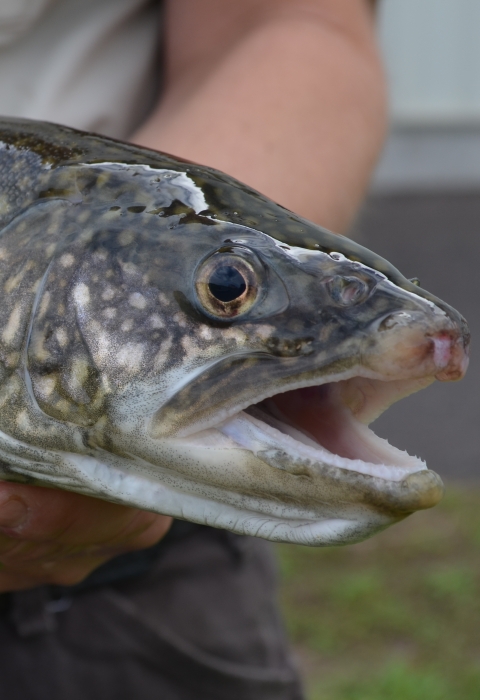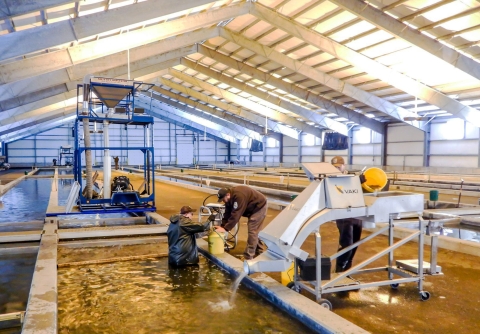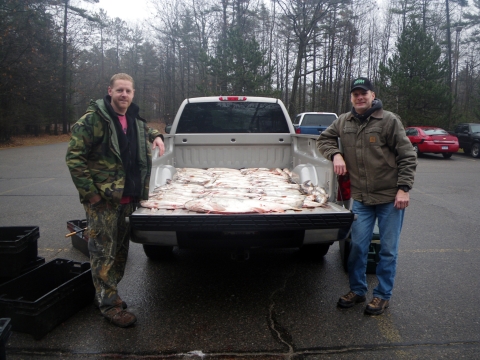If you’ve visited Wisconsin, Michigan or the other states that touch Lake Michigan, you’ve likely enjoyed a meal of lake trout, walleye or whitefish. Did you know that a team of biologists likely helped make that meal possible? We at the U.S. Fish and Wildlife Service know that the commercial fishery of the Great Lakes depends on our science and expertise in fish rearing and stocking. We’re also responsible for keeping this trade legal. Learn by reading on about how we shut down the illegal harvest and sale of these fish that altogether profited millions of dollars by cheating the system and defrauding taxpayers.
Our proactive investigation started in 2011, with the aim of looking with our counterparts in Michigan, Wisconsin and several Tribal Nations into an ongoing problem in the Great Lakes. Fish populations were low due to invasive species invasive species
An invasive species is any plant or animal that has spread or been introduced into a new area where they are, or could, cause harm to the environment, economy, or human, animal, or plant health. Their unwelcome presence can destroy ecosystems and cost millions of dollars.
Learn more about invasive species , overfishing and other factors, even though we’ve been rearing and stocking lake trout since the 1950s. The investigation developed into a full undercover business with more than 10 U.S. Fish and Wildlife Service special agents and multiple detectives with the Michigan Department of Natural Resources working a complex operation in the town of Baraga, Michigan. After several subjects reoffended and we continued our investigation over the years, the last subject was sentenced in December 2023 and restitution is now ongoing.
After multiple prosecutions by the Justice Department’s Environmental Crimes Section, the case known as Operation Fishing for Funds resulted in 26 convictions and more than $3.9 million in total restitution to be paid to the National Fish Hatchery System, as well as Tribal fish hatcheries. Of these convictions, five were felonies and included four businesses. While each defendant’s illegal conduct varied, and was sometimes in coordination, their collective conduct involved the illegal harvest and sale of Great Lakes fish. Their conduct impacted residents and travelers who unknowingly bought these ill-gotten fish.
“Complex and lengthy undercover investigations like this are worth the effort and sometimes are the only way to prove that people are knowingly violating the law, and to what extent. Successful investigations like this, are also built on essential coordination with our fellow federal, state and Tribal Nations counterparts,” said Edward Grace, Assistant Director of the Office of Law Enforcement.
Why the high financial penalty?
Simply put, the illegal operations were benefiting from taxpayer-funded federal, state and Tribal conservation work that was seven decades in the making. Over the 70-year history that we’ve been working to restore the Great Lakes fishery, U.S. Fish and Wildlife Service staff have produced and stocked more than 300 million lake trout. That's a lot of fish! These fish were at the heart of the schemes that sold illegally harvested fish into area fish markets, restaurants and smoked fish shops. When our investigation exposed the wider criminal expanse, it became clear that these violators weren’t fishing for fish, they were fishing for federal funds. Hence the investigation name, Operation Fishing for Funds.
This was no small violation of a few folks going past their limit, this was a massive fraud on taxpayers. Due to negative impacts of invasive species and significant overfishing, we’ve built a large infrastructure of fisheries professionals across an equally large geography who have all been focused on lake trout populations. From maintaining remnant adult brood stock and adding pre-screened wild gametes for future adult brood stock, to raising yearlings and transporting them to various waterways, the National Fish Hatchery System that we maintain in the Great Lakes has eight facilities spread out all over the country with teams who have been dedicated to building a sustainable lake trout fishery.
The great news is that we’ve turned the tide in other parts of the Great Lakes region. As of 2008, we stopped our stocking efforts in Lake Superior and consider the fishery restored. As of 2018, Lake Huron stocking requests were reduced by nearly 60% due to progress in restoration. Another positive outcome is that since 2014, lake trout populations have recovered a fair amount in one of the main areas of the investigation.
“Healthy fisheries promote biodiversity and support local communities. Restocking efforts are important in reinvigorating those fisheries, but illegal overharvesting undermines these efforts, ultimately taking advantage of federal investments. The widespread illegal fishing and trafficking varied from coordinated to independent ventures, and we worked to hold each individual accountable under the law,” said Assistant Attorney General Todd Kim of the Justice Department’s Environment and Natural Resources Division.
Undercover agents for wildlife crime? Yes!
So, how did we crack this case? We went undercover. While there are state and Tribal game wardens and other law enforcement professional working on protected lands and waters, we also have federal special agents who are plain clothes criminal investigators who work behind the scenes to enforce federal wildlife laws. We investigate wildlife crime wherever it occurs in the United States, and even work globally with our international counterparts. Our agents work in settings that range from major cities to rural towns and even work in remote wilderness areas.
Like all criminal investigators, we collect evidence, interview witnesses, question subjects, conduct surveillance, execute search warrants, make arrests and help prepare cases for court. In addition, we often work undercover to infiltrate wildlife trafficking rings, illegal guiding operations and other criminal groups to document violations from the inside.
We can’t do this work alone though. Operation Fishing for Funds was investigated by the U.S. Fish and Wildlife Service Office of Law Enforcement, with assistance of the Michigan and Wisconsin Departments of Natural Resources. The prosecutions were handled by prosecutors from the Justice Department’s Environmental Crimes Section, with assistance from the U.S. Attorney’s Offices for the Western and Eastern Districts of Michigan, and the Eastern District of Wisconsin, as well as Grand Traverse Band of Ottawa and Chippewa Indians, Red Cliff Band of Lake Superior Chippewa Indians and Sault Ste. Marie Tribe of Chippewa Indians.







